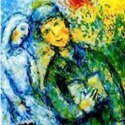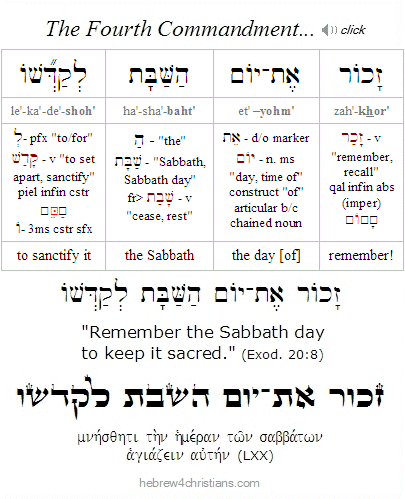|
The Torah (and therefore all of Scripture) begins with the majestic account of the "six days of creation." However, before the creative work of God is described (relative to the earth), there was only an undifferentiated mass of tohu vavohu v'choshekh: "confusion and emptiness and darkness." The Spirit of God (רוּחַ אֱלהִים) is depicted as "hovering" (like a circling dove) over the surface of the "waters of chaos" to bring order and perfection to the world (Gen. 1:2). Then God said, 'Let there be light,' and there was light" (Gen. 1:3). As I mentioned in another place, the creation of the divine light implies divine time, and indeed the later creation of the sun, the moon, and stars were designed to function as "signs and seasons" for creation: "And God said, 'Let there be lights in the expanse of the heavens to separate the day from the night. And let them be for signs and for appointed times (מוֹעֲדִים), and for days and years' (Gen. 1:15).
On the seventh day, God "rested" (שָׁבַת) from the works of creation (מַעֲשֵׂה-בְּרִאשִׁית) and Shabbat came into being. God called the seventh day "holy" (kodesh), which means set apart as sacred, exalted, and honored. After the Exodus from Egypt, the Sabbath was consecrated as an "everlasting sign" (אוֹת) between God and Israel: "Therefore the people of Israel shall keep the Sabbath, observing the Sabbath throughout their generations, as a covenant forever (בְּרִית עוֹלָם). It is a sign forever (אוֹת עוֹלָם) between me and the people of Israel that in six days the LORD made heaven and earth, and on the seventh day he rested (שָׁבַת) and took a breath" (Exod. 31:16-17). Note that some of the sages have said that the idea that Shabbat is a "sign forever" means that it is a "sign of Eternity," that is, a reminder that we live in a spiritual world where God alone is our Creator.
The idea of "rest" does not mean that God anthropomorphically "got tired" from creating the universe. As the prophet said, "Have you not known? Have you not heard? The LORD is the everlasting God (אֱלהֵי עוֹלָם), the Creator of the ends of the earth (בּוֹרֵא קְצוֹת הָאָרֶץ). He does not faint or grow weary..." (Isa. 40:28). God did not become "exhausted" creating the universe, and indeed the sages teach that the act of creation involved less effort than to breathe out the letter Hey (ה), the easiest letter to pronounce (Bereshit Rabbah 12:2).

The idea of God "resting," then, refers to His sovereign choice to stop creating yesh me'ayin ("ex nihilo"). The Rambam (Maimonides) distinguishes between two different actions attributed to God throughout the creation narrative. When the Torah says that God spoke (e.g., "and God said, 'Let there be light'"), He brought something entirely new into being, but when God saw (e.g., "and God saw that it was good"), he sustained (or renewed) what He made. This act of "seeing" (or sustaining) is not passive, however, since God continues to uphold creation at all times, and were He to withdraw from creation, it would collapse back into "confusion and emptiness and darkness." Therefore the daily prayers include the phrase: "You renew in your goodness, each day, constantly, the works of creation."
Of course Yeshua is our Creator and LORD who upholds the universe "by the word of his power." The "Word made flesh" is the "image of the invisible God" (צֶלֶם הָאֱלהִים) and the "radiance of the glory of God (זהַר כְּבוֹדוֹ) who is the exact imprint (χαρακτήρ, 'character') of God's nature" (Heb. 1:3; Col. 1:15). "All things were created by Him (i.e., Yeshua), and for Him" and in Him all things consist (συνεστηκεν, lit. "stick together") (Col. 1:16-17).
So what does it mean to "rest" on the Sabbath? Among other things, it means letting go of our "works," that is, our attempts to exert control over creation. The Torah commands us to remember (zachor) that we were slaves to sin (pictured by our bondage in Egypt) and therefore to celebrate Shabbat as a picture of God's salvation and redemption (Deut 5:15). For the Christian, the idea of rest has a redemptive significance that is connected to trusting in the finished work of redemption (Heb. 4:9-10). Because of Yeshua, we are made free from the "law of sin and death" in order to live in freedom as God's redeemed children. But paradoxically we are called to "strive" to enter that rest through the exercise of faith - and are warned not to revert back to attempts at self-justification or vain attempts at "moral reformation" (Heb. 4:11). We "labor" through the grace of God which is in us" (1 Cor. 15:10) since our sufficiency is from God (2 Cor. 3:5). In the Talmud the Messianic Age is called Yom SheKulo Shabbat - the day when "all will be Sabbath" (Tamid 7:4). Because of Yeshua's merit, we can enter that rest through faith.... Therefore we share in God's victory and salvation given to us through Yeshua our Lord.
The "deeper sense of rest" describes our salvation experience in the Messiah. Just before Yeshua died, he said something of breathtaking importance. An eyewitness to his crucifixion wrote, "When he had received the drink, Yeshua said, 'It is finished.' With that, he bowed his head and gave up his spirit" (John 19:30; Matt. 27:50). In Koine Greek, this final statement is a single word consisting of ten letters: tetelestai (Τετέλεσται).
Tetelestai means "It is finished, it stands finished, and it always will be finished!" It comes from the word telos (τέλος), meaning a goal or purpose (teleology is the study of the purpose of something). Telos is the word Paul used when he wrote: "For Messiah is the end of the law (τέλος νόμου) for righteousness to everyone who believes" (Rom. 10:4).
Tetelestai was the cry of victory to the Father. "I have finished the work you gave me to do." What was that work? To establish the new covenant (brit chadashah) between God and man by offering up His life as the atoning sacrifice for humanity's sins (Heb. 1:3, 10:12). Note that the Greek word for "new" here is kainos (καινός), which is often used to describe something of a new kind or order (the Greek word neos [νέος] often refers to something recent or something that is renewed).
Imagine for a moment what it might have been like to hear Yeshua cry out "in a loud voice," Tetelestai! His final breath, His kiddush Hashem, His spirit given up and now released before the Father - the resonance of this word filling all heaven and all earth - "It is finished! Father! It is finished! I have completed the work that you have given me to do!" Imagine the joy, the celebration, the glory, the honor given to the Son as He appeared before the Father after securing us so great a salvation.
"Whoever has entered God's rest has also rested from his works as God did from his (Heb. 4:10)." Getting ahold of this truth is a "tetelestai" revelation -- a moment when you apprehend that God has fulfilled the Torah's demand on your behalf through the gift of Yeshua's life and sacrifice (2 Cor. 5:21). Accepting the "death benefits" of the Messiah makes you an heir to the Kingdom of Heaven (Gal. 4:4-7). You are no longer "married" to the former arrangement of being in union with God; there is a better cup and a better ketubah (Rom. 7:1-4).
God rested on the seventh day because His "creation-work" was finished. The Jewish idea of melakhah (work) that is forbidden on the Sabbath pertains to any actions that exhibit control or mastery over natural creation, as illustrated by those actions required to create the Mishkan (i.e., Tabernacle), the ritual altar of the Levitical priesthood. According to the rabbis, the main Sabbath ritual is "negative" action: One observes the Sabbath by not doing. Applied to the realm of the spirit, we see that this implies that God alone is our Redeemer and Healer. We are commanded to rest from our works because we cannot add to the finished work of Yeshua performed on our behalf... "Violating the Sabbath," from this perspective, means attempting to add something to the finished work of God's redemptive love as revealed in Yeshua. Salvation - like physical creation - is "of the LORD," and the salvation of God "makes all things new" (Rev. 21:5). The "new creation" is completely new, brought about from nothing, just as the universe was created by God yesh me'ayin, from nothing. We can partake of God's love without any positive effort: All we must do is refrain from "work" -- and God does the rest... All of creation will ultimately be recreated because of the finished work of Yeshua. Therefore we are called a "new creation" (בְּרִיאָה חֲדָשָׁה) in Messiah, and we can rest in God's love and acceptance. We now have peace with God through the healing work of Yeshua our LORD. We can "let go" and "let God" be God. We can rest in His love for us, chaverim... Accept that you are accepted because of the work of Yeshua done for you.
According to Jewish tradition, God created man on the sixth day (erev Shabbat). When Adam first opened his eyes and human consciousness was born, he immediately understood that the LORD created all things, including himself. According to midrash, Adam's first words were, יהוה מֶלֶךְ עוֹלָם וָעֶד / Adonai malakh olam va'ed: "The LORD is King for ever and ever." God then said, "Now the whole world will know that I am King," and He was very pleased. This was the "tov me'od" (טוֹב מְאד) moment of creation, when God saw all that He had made "and found it very good" (Gen. 1:31). The birthday of humanity is therefore Rosh Hashanah ("the head of the year") and the Coronation Day for the King of the Universe.
In Genesis 2:2 it is written, "On the seventh day God finished his work that he had done, and he rested on the seventh day from all his work." But how could God could have finished on the seventh day and also rested? The midrash states that on the very first Sabbath, God created rest. In other words, after He created the universe, God ascended the throne as the King of the Universe, the Master of peace and truth (Mal. 3:6). It was only after God created all things - including mankind - that He could rule over the work of His hands. The Sabbath day therefore became symbolic of God's rule where He made the world His dwelling place. Rather than continuing to "work" on creation, God brought it into harmony with His role as our King and Redeemer. Ultimately, God's salvation brings the entire universe into a state of peace (shalom) and harmony with His purposes for creation. This is the deeper sense of rest that God gives to those who are trusting in Him.
Hebrew Lesson
Exodus 20:8 Hebrew reading & comments (click):
|




